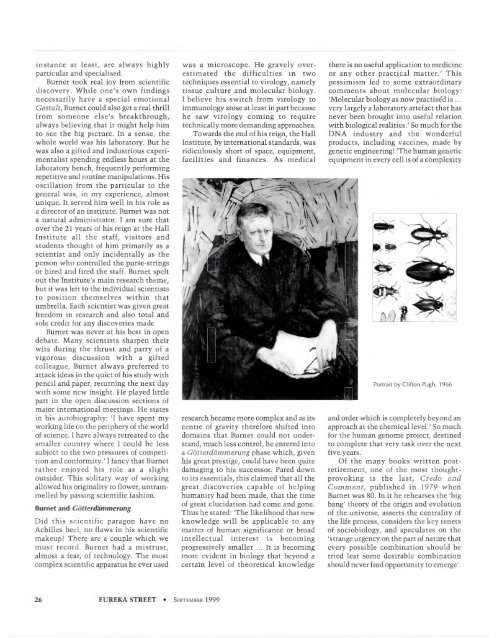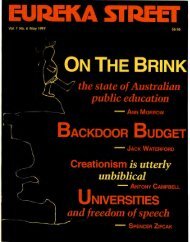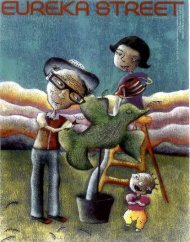ins tance a t least, are always highlyparticular and specialised.Burnet took real joy from scientificdiscovery. While on e's own findingsn ecessarily have a special emotionalGestalt, Burnet could also get a real thrillfr om som eon e else's breakthrough,always believing that it might help himto see the big picture. In a sense, thewhole world was his laboratory. But hewas also a gifted and industrious experimentalist spending endless hours at thelaboratory ben ch, fr equently performingrepetitive and routine manipulations. Hisoscillation from the particular to thegeneral was, in my experience, almostunique. It served him well in his role asa director of an institute. Burnet was nota natural administrator. I am sure thatover the 21 years of his reign at the HallInstitu t e all the st aff, visitors andstu den ts thought of him primarily as ascientist an d only incidentally as theperson who controlled the purse-stringsor bired and fired the staff. Burnet speltout the Institute's main research them e,bu t it was left to the individual scientiststo position t hem selves within th a tumbrella. Each scien tist was given greatfreedom in research and also total andsole credit for any discoveries madeBurnet was never at his best in opendebate. Man y scientists sh arpen theirwits during the thrust and parry of avigorou s discu ssion with a giftedcolleague. Burnet always preferred toattack ideas in the quiet of his study withpencil and paper, returning the next daywith some new insight. He played littlepart in the open discussion sections ofmajor international m eetings . He statesin his autobiography: 'I have spent myworking life on the periphery of the worldof science. I have always retrea ted to thesmaller cou n try where I could be lesssubject to the two pressures of competitionand co nformity.' I fa ncy that Burnetrather enjoyed his role as a sligh tou tsider. This solitary way of workingallowed his originality to fl ower, untram melled by passing scientific fas hion .Burnet and GotterdammerungD id th is scientific paragon have n oAchilles heel, no fla ws in his scientificmakeup? There are a couple which wemust record . Burnet had a mistrust,almost a fear, of technology. The mostcom plex scientific apparatus he ever usedwas a microscope. H e gravely overestimatedthe difficulties in twotechniques essential to virology, namelytissue culture and molecular biology.I believe his switch from virology toimmunology arose at least in part becausehe saw virology coming to requiretechnically more demanding approaches.Towards the end of his reign, the HallInstitute, by international standards, wasridiculously short of space, equipment,facilities and finances . As m edicalresearch became more complex and as itscentre of gravity therefore shifted intodom ains that Burnet could not understand,much less control, he entered intoa Gbtterdammem ng phase which, givenhis great prestige, could have been quitedamaging to his successor. Pared clownto its essentials, this claim ed that all thegrea t discoveries capable of h elpinghumanity had been made, that the timeof grea t elucidation had com e and gone.Thus he stated: 'The likelihood that newknowledge will be applicable to an ymatter of human significance or broadintellectual interest is becomingprogressively sm aller ... It is becomingmore evident in biology that beyond acertain level of theoretical know ledgethere is no useful applica tion to m edicineor any other practical m atter.' Thispessimism led to some extraordinarycomments about molecular biology:'Molecular biology as now practised is ...very largely a laboratory artefact that hasnever been brought into useful relationwith biological realities.' So much for theDNA industry and the wonderfulproducts, including vaccines, m ade bygenetic engineering! 'The human geneticequipment in every cell is of a complexity-~~,··~ ··/ .Portrait by Clifton Pugh, 1966and order which is completely beyond anapproach at the chemical level.' So m uchfor the human genome project, destinedto complete that very task over the nextfiv e years.Of the m an y books written postretiremen t, on e of the m ost though tprovoking is the las t, Credo andComment, publish ed in 1979 w henBurnet was 80. In it he re hearses the 'bigbang' theory of the origin and evolutionof the universe, asserts the cen trality ofthe life process, considers the key tenetsof sociobiology, and speculates on the'strange urgency on the part of nature thatevery possible combina tion should betried lest som e desira ble combinationshould never find opportunity to emerge'.~.26 EUREKA STREET • S EPTEMBER 1999
This implicit assertion of purpose inDarwinian evolution is surprising in on ewho had formerly been a militant atheist.H e supposes tha t 'God, n ature orevolution is so constituted that theremust be a constant searching for andachieving of creativity, a progressivelyhigher level of complexity, understandingand control of significant areas of theuniverse'. He states that 'th e biologicalscientist can go no further than God asthe sh adowy personification of theunknowable principle of constantlyem erging novelty' . Such a God may beomnipotent and omniscient 'but h e haslimited himself to a single way ofattaining the divine desire by providinginfinite opportunities for an infinitelyimprobable event to occur'. Thus does thegreat biologist bend just a little in thedirection of religion .Influenced by Alfred North Whitehead,Burnet seem s to be groping for aview not too distant from that of Teilhardde Ch ardin, so trenchantly derided byBurnet's fellow N obel Laureate, PeterMedawar. Burne t once told DavisMcCaughey that som e of the things aChristian theologian was concerned withexpressed his thought in another idiom .The powerful humanism of Credo andComment m ay show that Burne t 'sPresbyterian upbringing exerted acontinuing effect.Honours and AwardsBoth the scientific peer group and thecivil sector showered Burnet withhonours. He won the Royal and CopleyMedals of The Royal Society. H e servedas President of the Australian Academ yof Science. In the United States, h e was aForeign Associat e of the N ationalAcademy of Sciences and won the LaskerAward. He received countless h onorarydoctorates, including those from Oxford,Cambridge and Harvard. He was knightedin 195 1 and received the Order of Meritin 1958. The N obel Prize in 1960 couldhave been won three times over.The Burnetian LegacyThe Burnetian legacy can be examinedat three levels: personal, institutional andglobal. At the personal level, he was ahuge influen ce on every scientist whoworked within his orbit. Many of thesehave gone on to be leaders of Australianm edical science. Names like Ada,Fazekas, Fenner, French, Gottsch alk,Mackay, M etcalf, White and Wood tomention just a few, are surely ones toconjure with.The Institute which he dominated forso long becam e in his time one of thatsmall handful of medical research centreswhose n am e is instantly recognisedaround the globe as making a pre-eminentcontribution t o the m arch of worldscience. It is for others to judge the Nossalyears, but the fifth Director, ProfessorSuzanne Cory, is surelyenhancing the Hall Institute'sreputation while leading itinto n ew and excitingdirections.But the global legacy is themost important. Burnet's threephases of research involvedthe three threads bein gwoven into a unique andbeautiful tapestry through ablending of separate disciplines.Concepts were borrowed frommicrobiology, bioch emistry,immunology, genetics, oncologyand epidemiology tosynthesise a holistic view ofinfectious diseases and thehost's immune response.Burnet saw the centrality ofimmunology before anyoneelse. This discipline hasexpanded dramatically, yet many ofBurnet's ideas remain paradigmatic. Ofcourse it has m oved in differentdirections and is exploring new depths.This is how it should be, must be. Despitehis gloom y prognostications, Burne twould have been the first to delight inthe n ew approaches to auto-immunity,allergy, transplantation, immunisationand cancer which the subsequent 30years have brought. He would also havemarvelled at our understanding of thegenes, molecules and cells of the immunesystem, so much more profound than heor anyone else could have imagined.I would like to think that in less gloomymoments h e would also have revelled inthe challenges of how much more thereis to know, and in the power of thetechniques of the new biology.Burnet stated that incursions from theoutside world, such as infection ortrauma, were easier to deal with thanchronic degenerative diseases ofuncertain and complex causation. Whatwould h e have thought of the aggressiveand so often successful treatment of heartattacks by angioplasty, clot-busting drugsor biologicals, and st ents to prop theart eries open ? What would h e havethought of severe rh eumatoid arthritisbeing materially ameliorated by injectionof antibodies against powerful inflammatorymolecules? What would he havemade of cures of adult leukaemia throughnew forms of blood cell transplantationu sing CSFs, gen etically en gineeredBurnet with hi s successor at th e W alter and Eli za Hall Institute,Gustav Nossa l, circa 1965.m olecules discovered in his own belovedHall Institute?These and other stunning advancesare blunting the attack of many chronicdiseases. Were h e able to revisit us on3 September 1999, his lOOth birthday,and were I to tell him all that, I fancy hewould stand with eyes downcast and halfclosed, brow puckered in concentration,curled right forefinger held to his lips ina characteristic gesture of deep puzzlement, then gradually his face would relaxinto a self-conscious little smile. 'Gus,'he would say, 'I think I'll have to developa new working hypothesis! ' •Sir Gustav Nossal is Professor Emeritusat the D epartment of Pathology, Universityof Melbourne. He was Director of theWalter and Eliza Hall Institute from 1965to 1996.This article is an edited version of the20th Daniel Mannix Lecture organisedby the students of N ewman College,University of Melbourne.V O LUME 9 NUMBER 7 • EUREKA STREET 27
















